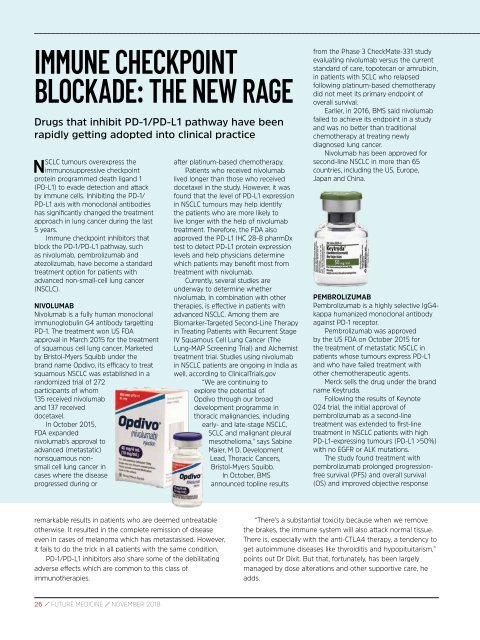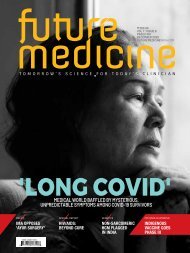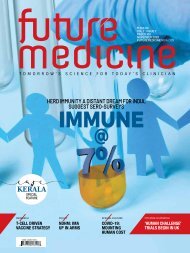You also want an ePaper? Increase the reach of your titles
YUMPU automatically turns print PDFs into web optimized ePapers that Google loves.
IMMUNE CHECKPOINT<br />
BLOCKADE: THE NEW RAGE<br />
Drugs that inhibit PD-1/PD-L1 pathway have been<br />
rapidly getting adopted into clinical practice<br />
NSCLC tumours overexpress the<br />
immunosuppressive checkpoint<br />
protein programmed death ligand 1<br />
(PD-L1) to evade detection and attack<br />
by immune cells. Inhibiting the PD-1/<br />
PD-L1 axis with monoclonal antibodies<br />
has significantly changed the treatment<br />
approach in lung cancer during the last<br />
5 years.<br />
Immune checkpoint inhibitors that<br />
block the PD-1/PD-L1 pathway, such<br />
as nivolumab, pembrolizumab and<br />
atezolizumab, have become a standard<br />
treatment option for patients with<br />
advanced non-small-cell lung cancer<br />
(NSCLC).<br />
NIVOLUMAB<br />
Nivolumab is a fully human monoclonal<br />
immunoglobulin G4 antibody targetting<br />
PD-1. The treatment won US FDA<br />
approval in March 2015 for the treatment<br />
of squamous cell lung cancer. Marketed<br />
by Bristol-Myers Squibb under the<br />
brand name Opdivo, its efficacy to treat<br />
squamous NSCLC was established in a<br />
randomized trial of 272<br />
participants of whom<br />
135 received nivolumab<br />
and 137 received<br />
docetaxel.<br />
In October 2015,<br />
FDA expanded<br />
nivolumab's approval to<br />
advanced (metastatic)<br />
nonsquamous nonsmall<br />
cell lung cancer in<br />
cases where the disease<br />
progressed during or<br />
after platinum-based chemotherapy.<br />
Patients who received nivolumab<br />
lived longer than those who received<br />
docetaxel in the study. However, it was<br />
found that the level of PD-L1 expression<br />
in NSCLC tumours may help identify<br />
the patients who are more likely to<br />
live longer with the help of nivolumab<br />
treatment. Therefore, the FDA also<br />
approved the PD-L1 IHC 28-8 pharmDx<br />
test to detect PD-L1 protein expression<br />
levels and help physicians determine<br />
which patients may benefit most from<br />
treatment with nivolumab.<br />
Currently, several studies are<br />
underway to determine whether<br />
nivolumab, in combination with other<br />
therapies, is effective in patients with<br />
advanced NSCLC. Among them are<br />
Biomarker-Targeted Second-Line Therapy<br />
in Treating Patients with Recurrent Stage<br />
IV Squamous Cell Lung Cancer (The<br />
Lung-MAP Screening Trial) and Alchemist<br />
treatment trial. Studies using nivolumab<br />
in NSCLC patients are ongoing in India as<br />
well, according to ClinicalTrials.gov<br />
“We are continuing to<br />
explore the potential of<br />
Opdivo through our broad<br />
development programme in<br />
thoracic malignancies, including<br />
early- and late-stage NSCLC,<br />
SCLC and malignant pleural<br />
mesothelioma,'' says Sabine<br />
Maier, M D, Development<br />
Lead, Thoracic Cancers,<br />
Bristol-Myers Squibb.<br />
In October, BMS<br />
announced topline results<br />
from the Phase 3 CheckMate-331 study<br />
evaluating nivolumab versus the current<br />
standard of care, topotecan or amrubicin,<br />
in patients with SCLC who relapsed<br />
following platinum-based chemotherapy<br />
did not meet its primary endpoint of<br />
overall survival.<br />
Earlier, in 2016, BMS said nivolumab<br />
failed to achieve its endpoint in a study<br />
and was no better than traditional<br />
chemotherapy at treating newly<br />
diagnosed lung cancer.<br />
Nivolumab has been approved for<br />
second-line NSCLC in more than 65<br />
countries, including the US, Europe,<br />
Japan and China.<br />
PEMBROLIZUMAB<br />
Pembrolizumab is a highly selective IgG4-<br />
kappa humanized monoclonal antibody<br />
against PD-1 receptor.<br />
Pembrolizumab was approved<br />
by the US FDA on October 2015 for<br />
the treatment of metastatic NSCLC in<br />
patients whose tumours express PD-L1<br />
and who have failed treatment with<br />
other chemotherapeutic agents.<br />
Merck sells the drug under the brand<br />
name Keytruda.<br />
Following the results of Keynote<br />
024 trial, the initial approval of<br />
pembrolizumab as a second-line<br />
treatment was extended to first-line<br />
treatment in NSCLC patients with high<br />
PD-L1-expressing tumours (PD-L1 >50%)<br />
with no EGFR or ALK mutations.<br />
The study found treatment with<br />
pembrolizumab prolonged progressionfree<br />
survival (PFS) and overall survival<br />
(OS) and improved objective response<br />
remarkable results in patients who are deemed untreatable<br />
otherwise. It resulted in the complete remission of disease<br />
even in cases of melanoma which has metastasised. However,<br />
it fails to do the trick in all patients with the same condition.<br />
PD-1/PD-L1 inhibitors also share some of the debilitating<br />
adverse effects which are common to this class of<br />
immunotherapies.<br />
“There’s a substantial toxicity because when we remove<br />
the brakes, the immune system will also attack normal tissue.<br />
There is, especially with the anti-CTLA4 therapy, a tendency to<br />
get autoimmune diseases like thyroiditis and hypopituitarism,”<br />
points out Dr Dixit. But that, fortunately, has been largely<br />
managed by dose alterations and other supportive care, he<br />
adds.<br />
26 / FUTURE MEDICINE / <strong>NOVEMBER</strong> <strong>2018</strong>


















